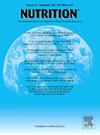Impact of age and educational qualifications on food label awareness: A study of edible oils and fats in India
IF 3.2
3区 医学
Q2 NUTRITION & DIETETICS
引用次数: 0
Abstract
Background
Consumer awareness of food labels plays a crucial role in promoting informed purchasing decisions and healthier dietary habits. However, the extent to which demographic factors such as age and education influence this awareness remains underexplored in the Indian context.
Objective
This study investigates the influence of age and education on consumer awareness of food labels of the edible oils and fats in India.
Methods
A cross-sectional survey was conducted with 2127 respondents using the questionnaire to ensure diverse demographic representation. Statistical analyses, including the chi-square test and Cramér's V, were applied to assess the relationships between educational qualifications, age, and food label awareness.
Results
The findings indicate a statistically significant association between educational qualifications and the practice of reading food labels. Higher educational attainment was correlated with greater food label awareness, though the strength of this association was weak. Age also influenced consumer behavior, with younger respondents demonstrating higher awareness levels compared to older age groups, although this relationship was less pronounced.
Conclusion
The study highlights the necessity of targeted educational interventions to improve food label literacy, thereby fostering healthier consumer choices and contributing to better public health outcomes.
年龄和教育资格对食品标签意识的影响:印度食用油和脂肪的研究
消费者对食品标签的认识在促进明智的购买决策和更健康的饮食习惯方面起着至关重要的作用。然而,在印度的情况下,年龄和教育等人口因素对这种认识的影响程度仍未得到充分探讨。目的本研究调查年龄和教育程度对印度消费者对食用油和脂肪食品标签认知的影响。方法采用横断面调查法,对2127名调查对象进行问卷调查,以确保人口统计的多样性。统计分析,包括卡方检验和cramsamr 's V,被用于评估教育程度、年龄和食品标签意识之间的关系。结果研究结果表明,教育程度与阅读食品标签的行为之间存在统计学上的显著关联。较高的教育程度与较高的食品标签意识相关,尽管这种关联的强度较弱。年龄也影响消费者的行为,与年龄较大的群体相比,年轻的受访者表现出更高的意识水平,尽管这种关系不太明显。结论:本研究强调了有针对性的教育干预的必要性,以提高食品标签素养,从而促进更健康的消费者选择,并有助于更好的公共卫生结果。
本文章由计算机程序翻译,如有差异,请以英文原文为准。
求助全文
约1分钟内获得全文
求助全文
来源期刊

Nutrition
医学-营养学
CiteScore
7.80
自引率
2.30%
发文量
300
审稿时长
60 days
期刊介绍:
Nutrition has an open access mirror journal Nutrition: X, sharing the same aims and scope, editorial team, submission system and rigorous peer review.
Founded by Michael M. Meguid in the early 1980''s, Nutrition presents advances in nutrition research and science, informs its readers on new and advancing technologies and data in clinical nutrition practice, encourages the application of outcomes research and meta-analyses to problems in patient-related nutrition; and seeks to help clarify and set the research, policy and practice agenda for nutrition science to enhance human well-being in the years ahead.
 求助内容:
求助内容: 应助结果提醒方式:
应助结果提醒方式:


